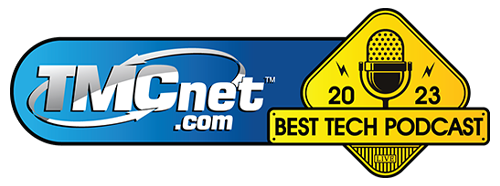EP 51: AI’s Transformative Role in Revolutionizing Healthcare
Exploring AI's Impact on Diagnostics, Patient Care, and Clinical Efficiency
Posted on April 3, 2024 by Fusion Connect
In this episode of Tech UNMUTED, we discuss the groundbreaking integration of Artificial Intelligence (AI) within the healthcare sector. Discover how AI technologies, including computer vision and naturallanguageprocessing, are not only enhancing diagnostic accuracy for X-rays, CT scans, and cancer detection but also streamlining patient care through intelligent automation. Our discussion highlights AI's capability to expedite clinical decisions, improve patient outcomes, and revolutionize traditional healthcare practices by supporting radiologists, analyzing blood tests, and facilitating doctor-patient interactions. With insights into AI's potential for early detection and its ethical considerations, this episode paints a vivid picture of a future where AI and human expertise collaborate to elevate healthcare standards globally. Join us as we explore the synergy between AI advancements and healthcare, promising a more efficient, accurate, and compassionate approach to patient care.
Watch & Listen
Tech UNMUTED is on YouTube
Catch up with new episodes or hear from our archive. Explore and subscribe!
Transcript for this Episode:
INTRODUCTION VOICEOVER: Dive into the world of innovation with us as we unravel the challenges, breakthroughs, and latest trends that are shaping our digital landscape. This is Tech UNMUTED, your guide to the tech revolution.
GEORGE: Welcome to the latest episode of Tech UNMUTED. Today, we're going to take a look at AI in healthcare, really at a higher level. How do you transform patient care, patient outcomes, using some of the things that are in the Microsoft platform?
SANTI: Yeah, and then just AI in general, right? Because there's stuff happening. Listen, I know that there's right now artificial intelligence that is able to read, are you ready for this? X-rays, and CT scans, and MRIs. In other words, you go in, get a scan, immediately, rather than wait for radiology, and immediately, AI's scanning and says, "Ah, I see something, it's a red flag." Now the radiologist comes in and confirms it. Notice I said the radiologist still comes in, right? [chuckles] It's not replacing the radiologist, but we can get to diagnosis quicker.
I thought that was phenomenal. It's using computer vision to analyze an image and tell you. Here's the one that really blew me away. I'm thinking, yes, computer image, or computer vision, I get that, it's looking at something, it's looking at an image. No, are you ready for this? I heard that from a pathology standpoint, they're taking the slides, you know where they put the blood on the glass slide, and then they look through a microscope, right? They're digitizing what the microscope sees so AI can scan it. It's actually starting to identify cancerous cells.
This is happening in the lab, real quick. You just took a blood test and AI's going, "Ah, red flag, we got to go look at this." This is the stuff that's happening now. Imagine where we're going to be five years from now with healthcare and artificial intelligence.
GEORGE: It's more, it can triangulate on so much more data than an individual human. You need the human involved, right?
SANTI: Of course.
GEORGE: They're going to be able to see some of the nuance that the AI might miss. Even, we talked about this earlier in the week, I had some blood tests done for my annual physical, the data came back, fortunately, nothing was flagged. There's usually a little flag in all the data. That data's always available from my doctor ahead of time. I can go in the portal and see it. I don't think he's thrilled about it because then you're self-analyzing. I took a whole section of data and dropped it into ChatGPT and said, "Oh, really? For somebody my age, a male, these readings, how do they compare? Are there any anomalies?" Those kind of things.
It came back with a fairly fact-based assessment, pointed some things out, "Hey, I can't fully analyze this versus this, but here's some details on it," with a link to where it came from. Because the risk is purely AI can't do the whole thing but, in that case, an individual patient on their own, if I had been able to get that AI-generated information upfront that said, "Hey, everything looks like it's in line." That might ease the patient's concern until they get into the doctor, they have a conversation.
The thing that you have to deal with is how do you react to something that is an anomaly that looks like an issue? The patient's already seen the data or has access to the data. How do you mitigate their concern with AI? Maybe there's another set of information in the way that AI reacts in those cases. I always look at the data and I suspect most other people, they get an e-mail that says the data and look at it.
SANTI: I never thought about putting mine through ChatGPT but next time I will. That's great, it's brilliant. Listen, in healthcare, when it comes to early detection, AI is having an immediate impact. That's a big one. Another one that is one we could probably relate to a little bit more because we're not in the healthcare field, and it's using basically natural language processing to, for example, do things like clinical documentation. Now they're having AI actively listen to the doctor-patient interaction and converting all the spoken language into some structured notes.
Now the doctor can focus on treating. When I go visit my doctor, we spend about two minutes talking and then she spends about 10 minutes typing. Now she can just focus on me and let the AI come up with the notes. That's something that's happening now. We can relate to that because Copilot does something similar inside of Microsoft 365. Same thing with patient communication. You and I have been navigating and playing around with some chatbots for well over a year now. Now they're looking at using these types of AI-driven chatbots, like virtual assistants to coordinate with patients.
Imagine now they can schedule appointments and provide some personal information, like you said, on demand. All that stuff's happening as we speak today. It's just that now it's implemented, but it's there, it's available there.
GEORGE: Think of the whole cascade. I'm at my annual physical. He spots something, "I need to prescribe you this medication." If that's recorded with an autonomous element behind it, at the end of it, all the notes are already there. At the end, he reconfirms with me because it pops up on his screen, "Hey, I need to call this prescription."
SANTI: There you go.
GEORGE: Just want to reconfirm this is what it is. You need to take it once a day and for the next 30 days" or whatever. He just clicks on the screen, signs, goes to the pharmacy, done, right? What did we just save there? Three minutes, but take three minutes across the entire day of that physician and you're now more productive.
SANTI: Across the entire day, across the entire week, across the entire month. Time is valuable. That's what AI does. By the way, not only that, but it can speed up the clinical decision-making process. Why wouldn't you want to be faster at reaching a clinical decision?
GEORGE: Agreed. Then if we think even further, how do you take that data and that interaction and potentially video data? How would you take that and analyze certain situations? If you think about mental health analysis.
SANTI: Oh, yes.
GEORGE: You could have a phone call that comes in that has some analytics that you could do on the voice. You could potentially have video analytics on body language and other things that would indicate the mental state that an individual is in to be able to help people to diagnose better, both people in the healthcare field, but even think beyond the healthcare field. Do you have other people in the environment? You have police officers, you have all kinds of other folks. Police officers with a video camera, they may not be able to fully assess the situation and understand the mental state of a person.
If that video that's already attached to them running can process in real-time and give some analytics and say, "Hey, this person's in crisis and the crisis is getting worse. You need to deescalate and you're not deescalating." Someone calls into a doctor's office, maybe they leave a voicemail. You may not totally pick up on the tone of the voicemail today, but if you had a series of data that you could analyze it against from an AI standpoint, you might know that it's a very stressed situation and react differently, or maybe that immediately alerts the doctor, hey, someone called in and they triggered this set of events.
There's an immediate response from the doctor to try to react to the situation.
SANTI: It's funny you said that because I read an article, there's actually a study going on right now, which is very precisely close to what you just described. I think they took 40-some individuals, 47 maybe. What they did over a period of 14 months, they basically had a place where they would call in and they would interact with an AI and answer certain questions. Then based on their responses, the AI was able to analyze the keywords and the patterns and say, "Hey, doctor, here's what's happening. You need to look into this particular patient a little bit deeper."
Or, "This one actually looks like he's improving." It's actually something that's happening now. You're right. Wow. Imagine if law enforcement had that where they can-- obviously, there's some things that are obvious. You can look at them, but there's some mental illness where they're trying to mask their true intention. That's how that-- Imagine the AI can pick up on this and say, "Hey, don't let your guard down. He's coming across as a non-threat, but the reality is here are the cues we picked up on. You need to approach with more caution. Don't let your guard down."
Imagine just something like that. That's huge.
GEORGE: Be able to anticipate a more compassionate response. Approaching that situation in a different way, knowing that there's a trigger. It even goes through, we briefly talked about it before, analyzing within an organization to understand sentiment on teams and is there friction being created in certain situations? You can often get a better outcome when you're more aware of what might be occurring. The final piece, we've talked about it a little bit before, but is how do you deal with the ethical considerations on this?
SANTI: They're still trying to figure stuff out, let's be honest. When it comes to healthcare especially, there's so many laws around it. There's stuff like, for example, privacy of course, HIPAA is a concern, that's a huge one. Honestly, believe it or not, there could be bias as well. The AI could have bias. You and I have seen that in some of the responses we've seen. We've seen that in some of the image generation we've seen. We've seen some bias, which is crazy. At the end of the day, I think these are all things that they will figure out.
They will have the right guardrails for it. Really, in healthcare, I believe that the most important element, honestly, from an ethical perspective, is really the human oversight. At the end of the day, we can lock down data. We can keep things from going here and there and the bias. It is the human oversight that I think is going to be key. In other words, we have to make sure that we're clear. AI should be augmenting the human expertise, not replacing it. That always needs to be an element from an ethical perspective when you're dealing with healthcare and AI.
I think that's the big one. All the other stuff, they'll figure it out. It may not be perfect at first, but they'll tweak it. I think we're already seeing AI having impacts in the healthcare industry. It's only going to skyrocket from here. It's skyrocketing in every industry. It's crazy. We're trying to keep up with it. It's just moving so fast. The impact is productivity, consistency of care, accuracy with a prescription as an example. If it's a written script, you very easily could get it.
GEORGE: I've not seen a written script in a long time. Most of my doctors do an automated thing to the pharmacy, but having the AI pick up on it and translate it and then recheck back with the physician, "Is this what you wanted to do even beyond what we said?" It could be they misspoke or it misunderstood and it says, "Was that the medication you really wanted to prescribe because I've looked at what you said with the patient and it doesn't seem to be the medication that would align to that?" You could get a better care outcome. You could get alternative medicines suggested that the physician may not have thought of. There's a lot of potential benefit, again, productivity, speed, accuracy, a whole bunch of things that would impact care.
SANTI: Listen, as AI continues to evolve, especially in all these different industries, healthcare specifically, we're going to bring you the latest and greatest. We're just going to keep talking about it and we're going to keep highlighting all the great things that are happening because the reality is, this is the future way of doing work, even in healthcare. Folks, this wraps up this podcast. We will be back with more, so stay tuned and don't forget to subscribe.
CLOSING VOICEOVER: Thanks for diving into the tech world with us today. Don't forget to subscribe and hit the bell icon to never miss an episode of Tech UNMUTED. Stay curious, stay connected.
Episode Credits:
Produced by: Fusion Connect
Citations:
Listen on Your Favorite Podcast Player:


Expert insights, exclusive content, and the latest updates on Microsoft products and services - direct to your inbox. Subscribe to Tech ROUNDUP!
Tech UNMUTED, the podcast of modern collaboration, where we tell the stories of how collaboration tools enable businesses to be more efficient and connected. Humans have collaborated since the beginning of time – we’re wired to work together to solve complex problems, brainstorm novel solutions and build a connected community. On Tech UNMUTED, we’ll cover the latest industry trends and dive into real-world examples of how technology is inspiring businesses and communities to be more efficient and connected. Tune in to learn how today's table-stakes technologies are fostering a collaborative culture, serving as the anchor for exceptional customer service.
Get show notes, transcripts, and other details at www.fusionconnect.com/techUNMUTED. Tech UNMUTED is a production of Fusion Connect, LLC.
 Amazon Music
Amazon Music Podcast Index
Podcast Index TuneIn
TuneIn Listen Notes
Listen Notes